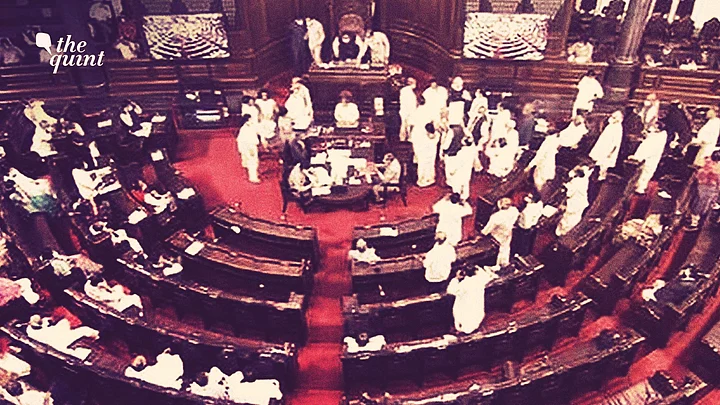Often described as a “temple of democracy”, India’s Parliament has, over the years, increasingly come to resemble a war zone.
The monsoon session, which was cut short by two days on Wednesday, was no different. While sloganeering by Opposition members has become a regular feature in Parliament, the sight of angry MPs rushing into the Well of the House, and tearing papers, has also been gradually accepted as a legitimate means of protest.
As such, this session saw these all-too-familiar scenes being played out, with Opposition members going a step further when Congress MP Pratap Singh Bajwa climbed on to the reporters’ table in the Rajya Sabha and flung a paper at the Chair. Further unprecedented scenes were witnessed in the Upper House when a large posse of marshals and security personnel were called in to block Opposition members from coming into the Well of the House while the controversial General Insurance Business (Nationalisation) Amendment Bill was being passed amid the ruckus.
BJP Govt Snubbed Opposition Demands
As a result, the curtailed monsoon session was a washout. The Opposition was insisting that a debate on the Pegasus spyware controversy be taken up on a priority basis, but the government refused to heed this demand on the plea that the concerned Minister had already made a statement on the issue. In the past, when treasury benches were faced with such a political deadlock, the government’s parliamentary managers and senior leaders would hold endless rounds of meetings with the Opposition in an effort to meet each other halfway. The purpose of such an exercise was to get the Opposition on board and ensure the smooth functioning of Parliament.
In this instance, however, no serious attempt was made to reach out to the Opposition except for a few perfunctory meetings. In any case, the Modi government has always been reluctant to heed the Opposition’s demands. Instead of extending an olive branch to the Opposition, the government responded by ramming through as many as 20 Bills in the din as its sole intention was to complete its legislative agenda. This means that not only were important Bills not referred to Parliamentary Committees for in-depth study, but they were passed without any discussion in the two Houses.
But Its Attitude is Nothing New
The government’s stance in this session was very much in line with its attitude to Parliament as seen through the past seven years. It has been particularly reluctant to refer Bills to specially-constituted Standing Committees set up in the nineties to provide a forum to Parliamentarians for deeper scrutiny of legislation.
According to PRS Legislative Research, only 25 per cent of the Bills introduced in the Modi government’s first term were referred to Committees for scrutiny. This is in stark contrast to 71 per cent, when the Congress-led United Progressive Alliance (UPA) government was in power. In the present Lok Sabha, only around 10 per cent of the Bills introduced have been referred to Parliamentary Committees.
When these committees were set up, it was decided that its meetings would be held away from the prying eyes of the media to enable its members to conduct their discussions in a bipartisan manner. It’s a different matter that these panels have become highly politicised since the Modi government came to power.
The members obviously take a cue from Prime Minister Narendra Modi, who is not known to have any patience with parliamentary conventions and procedures. The COVID-19 pandemic was used by the Modi government to do away with the Question Hour in last year’s monsoon session, while the following winter session was cancelled, depriving the Opposition of an opportunity to grill the government on its policies and programmes.
Modi and Shah’s Rare Appearances
Unlike the earlier BJP leaders like Atal Behari Vajpayee and L.K.Advani, who enjoyed the cut and thrust of a parliamentary debate, Modi avoids Parliament unless it is absolutely necessary for him to show up. During this monsoon session, Modi, as well as Home Minister Amit Shah, were conspicuous by their absence. It is ironic that on becoming Prime Minister in 2014, Modi had bowed his head on the steps of Parliament in reverence, and last year, while laying the foundation stone of the new Parliament building, Modi had quoted Guru Nanak, saying that conversation was the “soul of democracy”. Today, these gestures ring hollow.
If the Modi government is guilty of undermining Parliament, the Opposition has not exactly covered itself in glory with its unruly behaviour. Though Opposition members have every right to demand answers from the treasury benches, their conduct touched a new low this time.
In addition to losing public sympathy and support, the Opposition also lost out on holding the government accountable on a host of issues like its handling of the second wave of the pandemic, the demand of agitating farmers for the repeal of the three contentious farm laws, price rise and growing unemployment. Similarly, it also failed to contribute to discussions on key legislation, which, in turn, suited the government as it was able to pass all its Bills without a debate.
It is said of Parliamentary democracy that “the Opposition should have its say while the government should have its way”. In this monsoon session, the government was certainly successful in having its way. But what of the Opposition? Was it able to have its say?
(The writer is a senior Delhi-based journalist who can be reached at @anitaakat. This is an opinion piece and the views expressed are the author's own. The Quint neither endorses nor is responsible for them.)
